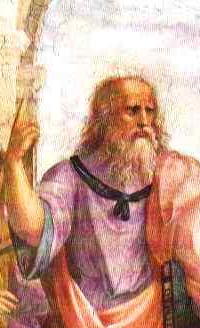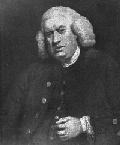
Plato

Socrates

Berkeley

Johnson
| Greek Mind |
The Greeks did not
think in the same way that we do. Consider their understanding of the body,
for example. The Greek, as Burgeon explains in Unancestral Voice,
did not think of these organs [the heart, the liver, the blood and the head ] and what Homer called the "psyche" inside it, were the seat of consciousness life and that the spirit flowed down from there into the genitals. In other words, if "potency," and our awareness of it, is to be equated with sex, it was they [and not the modern world] who suffered from |"sex in the head," and to an extent that [D. H.] Lawrence never dreamed of. . . . It's obvious, if you really go into the meanings of their words--as Onians did in his Origins of European Thought--that their whole consciousness was different. The two extremes--or rather the current of life in them--were linked in some way--there was a bridge, which has broken down. . . . (UV 14)In its earliest manifestations the Greek mind is fully participatory, as is apparent from its passionate nature:
I sometimes wonder [Hunter speculates in Worlds Apart] if [the Greeks] didn't enjoy the act of thinking in a way we know nothing of, I suppose because we've got too used to it. I wonder if they didn't almost roll their ideas round their brains and savor them like vintage port. I am thinking of what happens in a Greek play, when the Chorus stops thinking and takes part in the dialogue. . . . It comes out even more strongly in Plato's dialogues. It is almost incredible the pains that Plato--or Socrates, as Plato presents him--will take to hammer home the simplest point; how he will keep on at it, long after the greatest numskull in the world must have grasped it thoroughly and be straining at the leash to get on to the next point. (WA 57-58)In a similar vein, Sanderson later suggests that "Heraclitus simply wasn't able to think of [thinking] in that way [as his own--as a personal act]. If you like to put it so, the elements were thinking in him" (131-32).
"We are left no doubt
by Plato's Dialogues, and by the whole language and literature of Greece,"
Barfield explains in Saving the Appearances, as to the nature
of Greek collective representations].
In Ancient Greece,
it was the materialist who looked like a Berkeley, and the Greek equivalent of Dr. Johnson would return from speculation to common sense, not by kicking a stone, but by appealing to collective representations made obvious around him, and by the active cults which were his daily matter of fact experience.2 Even the atoms of Democritus were, of course, not atoms, as the word has been understood in the nineteenth and twentieth centuries. They were imagined as components of mind no less than of matter. (44-45)The Greek mind has shaped the evolution of consciousness most powerfully through language. "Wherever we turn in our language," he writes in History in English Words,
we have only to scratch the surface in order to come upon fresh traces of Rome and of her solid achievements in the world. With Greece, however, it is different. It was not the outer fabric of a future European civilization which the Greeks were building up while their own civilization flourished, but the shadowy, inner world of human consciousness. They were helping to create our "outlook." (36)"There is a strong tendency in the Greek language," Barfield goes on to explain, "with its reckless profusion of double epithets, its looser word-order, and its nervous twitchings of grammatical particles, to make itself felt as a living, muscular organism rather than as a structure; and it is quite in harmony with this that the terminology of grammar, most of which is derived from Greek, should have originated in so many cases as physical or psychological metaphor."
| See in particular "Thinking and Thought" (RCA 25-46), "Greek Thought in English Words,' "The Graeco-Roman Age," Saving the Appearances, Chap. XV. |
| 1Athens and Jerusalem, trans. Bernard Martin (Athens, OH: Ohio University Press, 1966). |
| 2Barfield is thinking of course of the famous account (from Boswell's Life of Johnson) of Samuel Johnson's refutation of the British idealist philosopher Berkeley by kicking a stone with his foot, thereby demonstrating the material reality of the external world. |